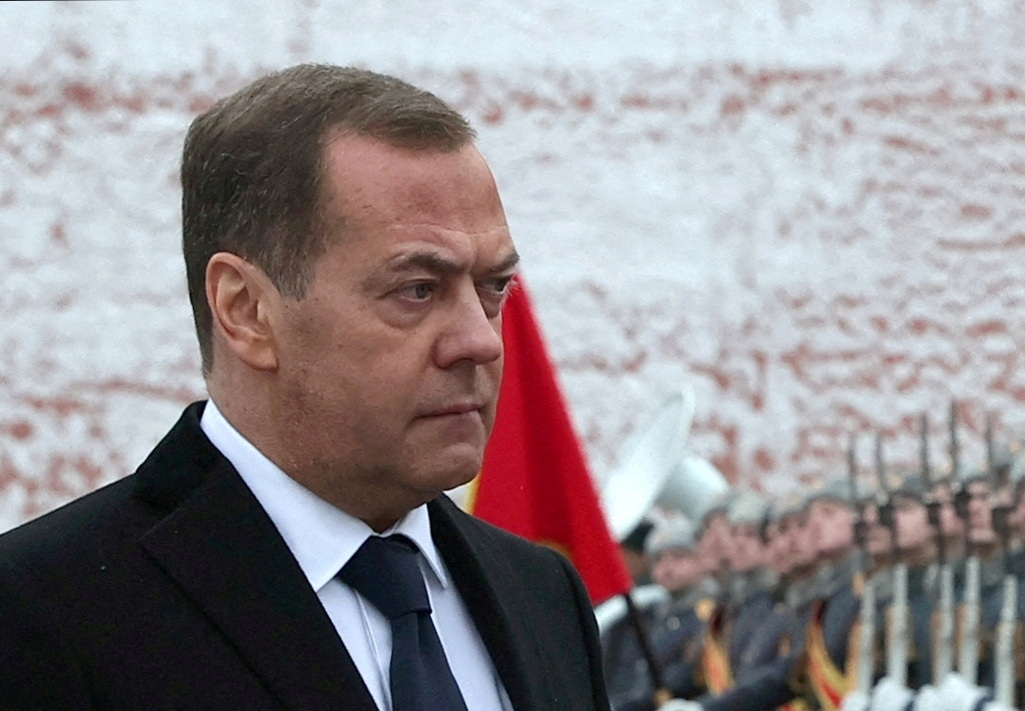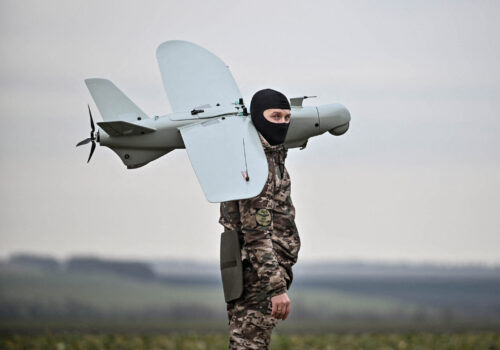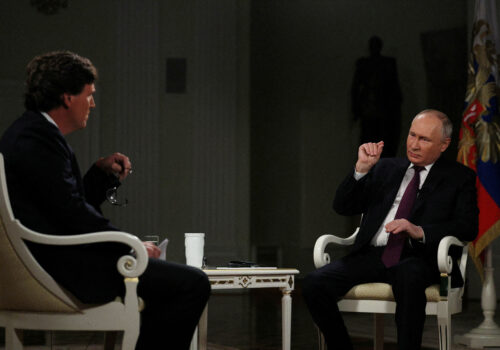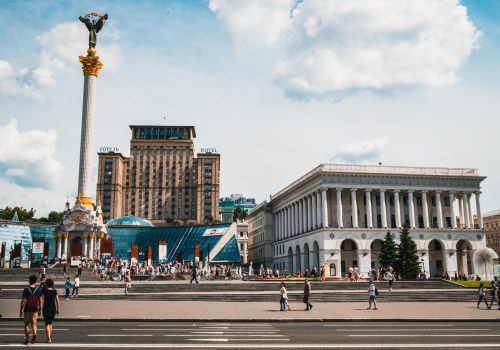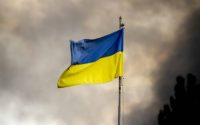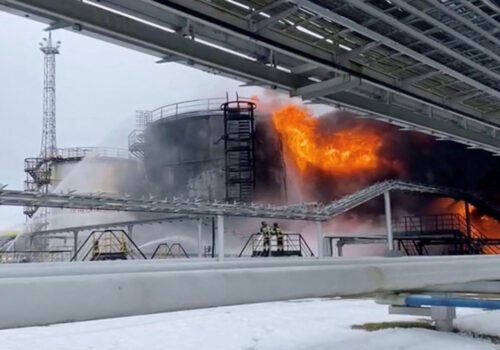
“Ukraine is Russia”: Medvedev reveals imperial ambitions fueling invasion
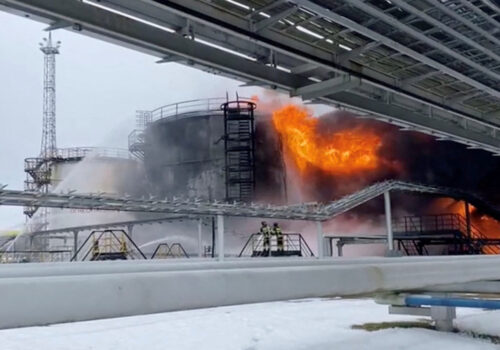
Former Russian President Dmitry Medvedev has provided chilling confirmation that Russia’s attack on Ukraine is an old-fashioned imperial war with the end goal of extinguishing Ukrainian identity. Speaking at a March 4 festival in Sochi, Medvedev spelled out his rejection of Ukrainian statehood and elaborated on the imperial objectives underpinning Russia’s ongoing invasion. “One of Ukraine’s former leaders once said Ukraine is not Russia. That concept needs to disappear forever,” he declared. “Ukraine is definitely Russia.”
Medvedev was referring to former Ukrainian President Leonid Kuchma’s 2003 book, “Ukraine Is Not Russia.” However, Russia’s imperial ambitions in Ukraine are far older and can be traced back hundreds of years. Beginning in the early decades of the eighteenth century, generations of Russian rulers have sought to erase the entire notion of a separate Ukrainian nation. They have employed a range of tools including settler colonialism, blanket russification, artificial famine, and the ruthless suppression of Ukrainian national identity.
The 1991 breakup of the Soviet Union led to a brief pause in this campaign. However, since the early years of his reign, Vladimir Putin has resurrected Russia’s historic claims to Ukraine. When Russian military aggression against Ukraine first erupted in spring 2014, the Kremlin soon began referring to southern and eastern Ukraine by the Tsarist era colonial name of “Novorossiya” (“New Russia”). Eight years later following the launch of Russia’s full-scale invasion, Putin announced the annexation of these Ukrainian regions while labeling them “historically Russian lands.”
Stay updated
As the world watches the Russian invasion of Ukraine unfold, UkraineAlert delivers the best Atlantic Council expert insight and analysis on Ukraine twice a week directly to your inbox.
Putin initially sought to portray the full-scale invasion of Ukraine as a crusade against “Ukrainian Nazis” and a response to decades of NATO expansion. However, as the war has unfolded, he has become increasingly open about the true nature of his imperial agenda in Ukraine. Putin has directly compared the current invasion to the eighteenth century imperial conquests of Russian ruler Peter the Great, and spent much of his recent high-profile interview with American media personality Tucker Carlson attempting to justify today’s war by arguing that Ukraine was historically part of Russia.
Dmitry Medvedev, who currently serves as deputy chairman of Russia’s influential Security Council, is notorious for echoing Putin’s imperialistic language toward Ukraine. Indeed, he has frequently been even more outspoken than Putin in his denial of Ukrainian statehood and his attacks on Ukraine’s allies. In recent months, Medvedev has warned of possible nuclear attacks on Washington, Berlin, and London, and has vowed to seize more Ukrainian territory including Kyiv.
All this is a far cry from Medvedev’s public persona in 2008 when he replaced Putin as Russian President. At the time, many in the West saw Medvedev as a liberal reformer who would steer Russia toward closer partnership with the West. In fact, the entire Medvedev presidency was a ploy designed to help Putin navigate a two-term constitutional limit before resuming his reign in 2012.
As his political star has waned, Medvedev has sought to reinvent himself as a Russian nationalist hawk. Although often derided as a somewhat buffoonish figure, the former head of state actually plays an important part in Russia’s carefully choreographed political theater. Following the death of Russian nationalist firebrand Vladimir Zhirinovsky in 2022, Medvedev has largely replaced Zhirinovsky as the Kremlin’s unofficial “court clown.”
In this role, Medvedev often makes outrageous statements and voices extremist opinions. This allows the Kremlin to gauge Russian public opinion and test international reaction, while also making Putin himself appear moderate in comparison. With Russia now actively seeking to deter international support for Ukraine by playing on Western fears of escalation, Medvedev’s often colorful threats have become a key element of the Kremlin’s information operations.
Eurasia Center events

Medvedev’s latest outburst is nothing new, of course. Indeed, senior Russian officials have been publicly questioning Ukraine’s territorial integrity since the early years of the post-Soviet era. This undercurrent of unapologetic imperialism was one of the main reasons why independent Ukraine’s second president, Leonid Kuchma, chose to write a book debunking Russia’s claims to his country. The publication of “Ukraine Is Not Russia” in 2003 directly challenged the Kremlin’s attempts to portray Ukrainians and Russians as indivisible, and was widely viewed in Moscow as a hostile act. Clearly, many within the Russian elite have not forgotten this very public rejection by a country they condescendingly regard as a younger sibling.
In the years following the appearance of Kuchma’s book, Ukraine underwent two pro-democracy revolutions, while Russia grew increasingly authoritarian. For the past decade, Russia’s escalating military aggression against Ukraine has served to further deepen the divide separating the two countries. As Ukrainian society has turned away from the Russian past and sought to embrace a European future, Russian public opinion toward Ukraine has become increasingly radicalized. Genocidal anti-Ukrainian rhetoric is now an everyday feature of the country’s political discourse and has been completely normalized throughout the Kremlin-controlled Russian media.
By declaring that “Ukraine is definitely Russia” and referring to the country as “an integral part of Russia’s strategic and historical borders,” Medvedev has made a mockery of international calls for a negotiated settlement to end the war. His unambiguous comments should be more than enough to remove any lingering doubts that Russia is committed to the destruction of Ukraine as a state and as a nation.
In such circumstances, any talk of a peace deal without Ukrainian victory is delusional. There can be no meaningful middle ground between Russia’s genocidal goal and Ukraine’s national survival. Instead, attempts to compromise with the Kremlin would be perceived in Moscow as an opportunity to rearm and regroup before launching the next phase of the invasion.
Many people like to laugh at Dmitry Medvedev. On social media, he is routinely depicted as an angry little man whose absurd antics are a symptom of Russia’s dysfunctional politics and his own personal struggle to remain relevant. However, there is nothing funny about the message he is now delivering. Medvedev’s comments confirm the imperialistic aims of the 2022 invasion and signal Moscow’s intention to wipe Ukraine off the map. With hundreds of thousands of Ukrainians already feared dead and dozens of Ukrainian cities reduced to rubble, his threats must be treated as deadly serious.
Dr. Taras Kuzio is professor of political science at the National University of Kyiv Mohyla Academy and Associate Research Fellow at the Henry Jackson Society. He was awarded the Peterson Literary Prize for his book “Russian Nationalism and the Russian-Ukrainian War: Autocracy-Orthodoxy-Nationality” (Routledge, 2022).
Further reading
The views expressed in UkraineAlert are solely those of the authors and do not necessarily reflect the views of the Atlantic Council, its staff, or its supporters.

The Eurasia Center’s mission is to enhance transatlantic cooperation in promoting stability, democratic values and prosperity in Eurasia, from Eastern Europe and Turkey in the West to the Caucasus, Russia and Central Asia in the East.
Follow us on social media
and support our work
Image: Russia’s Deputy head of the Security Council Dmitry Medvedev takes part in a wreath laying ceremony marking Defender of the Fatherland Day at the Tomb of the Unknown Soldier by the Kremlin Wall in Moscow, Russia, February 23, 2024. Sputnik/Yekaterina Shtukina/Pool via REUTERS
